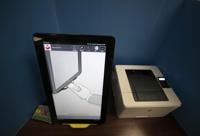ATLANTA (AP) — Georgia senators on Tuesday passed a bill to remove barcodes from ballots, one of numerous Republican-backed proposals aimed at addressing GOP discontent driven by Donald Trump's false claims that he won the state in 2020.
The Senate voted 31-22 to pass , sending it on to the House for more debate. It would mandate that printed text on ballots must be used to count votes, rather than a QR code, a type of barcode. The bill that passed the Senate would take effect July 1, despite Secretary of State Brad Raffensperger's position that it's already too late to make major changes before the 2024 presidential election in November.
Senate Ethics Committee Chairman Max Burns, the Sylvania Republican who sponsored the measure, said the measure would “create clarity.”
“The biggest challenge that a voter has is knowing that their vote was correctly recorded,” Burns said.
He and other Republicans also argue the measure would address what they say are vulnerabilities in Georgia's Dominion Voting Systems machines. There is no proof the machines have been hacked during an election, however.
After the 2020 election, supporters of former President Donald Trump spread wild conspiracy theories about Dominion machines, arguing the equipment was used to steal the election from him. The company has responded aggressively with lawsuits, notably reaching a in April with Fox News over that network's coverage of Dominion.
Some Republicans' distrust in Dominion’s machines has only grown after expert Alex Halderman demonstrated during a federal trial last month how someone could tamper with one of the machines to flip votes between candidates. Dominion and Raffensperger’s office say such a feat is impossible under real-world conditions. The company has released updated software to address vulnerabilities. But Raffensperger has said there isn’t enough time in the busy 2024 election cycle to update machines.
Also Tuesday, Burns' committee approved a state constitutional amendment that says only U.S. citizens can vote in Georgia elections. Supporters, including Raffensperger, claim the measure is needed to make sure no one ever changes the current Georgia law that bars noncitizens from voting. in other states have allowed noncitizens to vote in local elections. The measure goes to the full Senate, where it needs a two-thirds vote.
Burns' committee then heard testimony but did not vote on a bill that would eliminate drop boxes, where voters can walk into polling places and deposit ballots. Drop boxes have been targeted by Republicans as well.
The House has been considering its own bill to eliminate bar codes, but a committee hasn't yet voted. A House subcommittee on Tuesday considered but didn't vote on a bill allowing the State Election Board to investigate Raffensperger, driven by claims that he mishandled his audit of the 2020 election. The Senate earlier of that measure, which Raffensperger says violates the state constitution by setting up an unelected board to oversee him.
When Georgia voters cast ballots in person, they use Dominion ballot marking devices, which then print a paper ballot with a QR code and text indicating the voter’s choices. Scanners read the QR code to tabulate ballots. But legislators say voters tell them they distrust the codes because they can't be sure they'll match their choices.
Some lawmakers hope new optical scanners can be purchased and used to count ballots without QR codes this year. The House Appropriations Committee on Tuesday included $5 million in a proposed amendment to the current budget to buy such scanners and software. But House Appropriations Committee Chairman Matt Hatchett, a Dublin Republican, said the scanners would be used to audit election results, not perform the primary count after polls close. Raffensperger has supported their use for audits.
All Democrats, even one who voted to ban QR codes in committee, voted against the Senate bill Tuesday. They say it's too late to make changes and Republicans are inviting chaos. Sen. Sally Harrell, an Atlanta Democrat, noted she had opposed the use of QR codes when the state originally bought the Dominion machines.
“All I know is, we have an election around the corner and there is not time to deal with all this new technology now," Harrell said.
Even Burns conceded earlier that making changes by November probably wasn't realistic.
Raffensperger has said he supports a move to scan “human readable text." His proposal involves buying 32,000 ballot printers statewide to print longer ballots. His office estimated that would cost $15 million.








































